We ran a short developer survey with BlogGeek.me a couple weeks ago (see this post). We received 97 respondents as of last Friday, August 1. Tsahi randomly selected 3 winners – he has contacted them already so if you did not get his email we are sorry to say you did not win 2 free ebooks. However, you are still eligible for a 20% discount, and should have received an email with instructions with coupon codes.
97 respondents certainly is not a statistically valid sample size from a pool of thousands of active WebRTC developers (maybe more), but there several useful data points we can extract from the data.
Developer Types
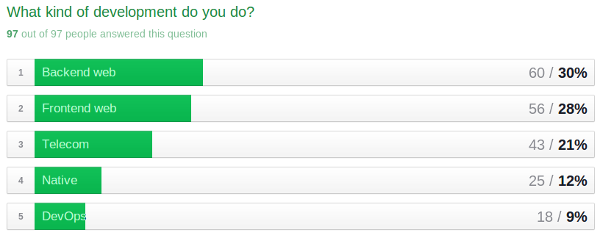
Our developer tool directory is divided into these options with the exception of DevOps. A year ago DevOps specific tools for WebRTC did not exist. I am starting to hear more about this and I do expect it will be a more substantial “tool” category in the near future.
There is supposed to be more frontend developers than back-end, so it is a little surprising that backend showed first. There was not a lot of pure frontend web developers at all (see a couple tables down). WebRTC generally does not work without some backend development somewhere (notable exception with the Serverless WebRTC project here). You can XaaS it from someone else but that generally implies some cost. This could mean WebRTC is still to hard for most pure frontend developers.
Likewise, Native is pretty far down the list. In my experience, Native is still pretty hard to do without shelling out some cash for paid SDKs. We’ll see how that changes on Android with native WebRTC coming to Android-L coming.
This was the only question that was a multiselect, meaning respondents could choose as many as were appropriate. More than anything, I was surprised to see the majority of respondents do more than one development type, with a third many doing 3 or more:
| Dev types selected | # | % |
| 1 | 41 | 42% |
| 2 | 22 | 23% |
| 3 | 25 | 26% |
| 4 | 3 | 3% |
| 5 | 6 | 6% |
Count of respondents who selected more than one developer type by count
This got me curious on questions like:
- Do back-end developers know more different types of development than native developers?
- Which development types tend to be supersets of the others?
Here is the full cross-tabulation:
| Frontend web | Backend web | Native | Telecom | DevOps | |
| Frontend web | 100% | 84% | 32% | 29% | 23% |
| Backend web | 78% | 100% | 30% | 37% | 27% |
| Native | 72% | 72% | 100% | 36% | 28% |
| Telecom | 37% | 51% | 21% | 100% | 21% |
| DevOps | 72% | 89% | 39% | 50% | 100% |
Percentage of respondents who selected more than one developer type by developer type
Based on this dataset (and assuming truthfulness), DevOps developers tend to have the most skills in other areas. Native developers know a lot of front and back-end.
And what was the group that was the most likely to note only one development skill: Telecom; nearly half of telecom respondents listed “telecom” with nothing else. Telecom respondents are either being modest or they need to beef up their skill set relative to their peers in other categories.
| Dev type | 1 | 2 | 3 | 4 | 5 | Grand Total |
| Frontend web | 14% | 30% | 39% | 5% | 11% | 100% |
| Backend web | 10% | 33% | 42% | 5% | 10% | 100% |
| Telecom | 47% | 12% | 21% | 7% | 14% | 100% |
| Native | 20% | 8% | 40% | 8% | 24% | 100% |
| DevOps | 11% | 0% | 50% | 6% | 33% | 100% |
Number of developer types selected as a percentage of dev type total by development type
Front-end frameworks
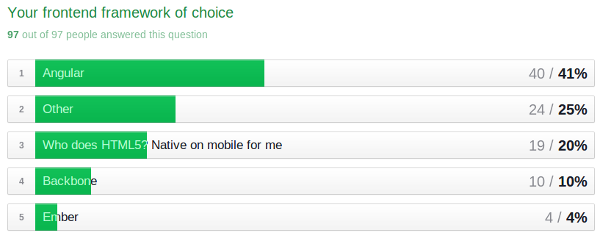
This one had me personally and several other members of the webrtcHacks team personally curious. One of the prize books after all is about Angular. I have been using jQuery for my projects lately and have been wondering if there is a better way as I consider more sophisticated applications.
“Other” was a significant response here – within that group jQuery showed up 4 times (4%). Nothing or custom was noted by 8 (8%)
Back-end frameworks and Tools
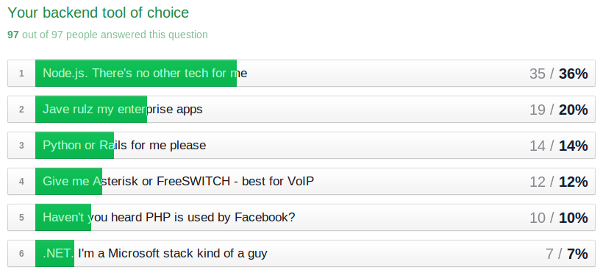
First, we apologize for neglecting to put an “other” category here. An other option should have been in there. Without having an “other” option, it is hard to predict how many would have choose that, but it is safe to say this would have lowered the responses for the above items by at least several percentage points.
No big surprises on the responses above, but I was curious to see how this matched the various developer types:
| Developer type | ||||||
| Framework/ tool | Total | Frontend web | Backend web | Native | Telecom | DevOps |
| Node.js | 36% | 46% | 43% | 24% | 30% | 33% |
| Java | 20% | 16% | 20% | 20% | 19% | 11% |
| Python or Rails | 14% | 13% | 12% | 16% | 16% | 22% |
| Asterisk || FreeSWITCH | 12% | 4% | 5% | 8% | 23% | 17% |
| PHP | 10% | 14% | 13% | 20% | 5% | 6% |
| .NET | 7% | 7% | 7% | 12% | 7% | 11% |
Cross tab of framework/tool question vs. developer type shown as a % of column total
No obvious trends here other than a general preference for Node.js. I was a little surprised to see Telecom so fragmented – I would have expected a stronger clustering around more traditional telecom tools like Java and Asterisk/FreeSwitch. Remember this data gets somewhat obscured because the Developer type question is a multi-select.
WebRTC specific tools and XaaS
We also had a freeform question to allow respondents to enter whatever tools they are using. 86% of respondents entered something. Below is an except of all the tools that were mentioned more than once:

Who’s next for WebRTC – IE, Safari, or iOS?
Not much to add here. We can keep checking status.modern.ie for the latest on Internet Explorer. Good luck trying to figure out what Apple is going to do.
How to learn about WebRTC?
It is good to see we have a loyal audience with webrtcHacks coming in first 🙂. There were also 4 “other” responses (4%) for github. That reminds me to mention I have been straightening up the webrtcHacks github page for my projects.
Final Thoughts
My main take-aways were:
- Node.js, Angular, and EasyRTC win this popularity contest.
- DevOps makes a meaningful appearance – this could be indicator that WebRTC is becoming production ready.
- Telecom development skills rank pretty low, but not as low as native development and DevOps
- Telecom skills are the most concentrated – our respondents with telecom skills need to broaden their development skill sets to include more web
I would definitely like to do this again in the future and give it a larger push to improve the response rate. In the interim we’ll keep the survey open – feel free to answer if you have not already. We’ll check-in on it periodically and update this post as necessary.
If you want to do your own analysis or see how I cut the data, you can view the raw results (minus any identifying information) and my workfile here.
You can also check out Tsahi’s post on the results here.
Thank you again to all the respondents – your contributions continue to help the WebRTC community!
{“author”: “chad“}


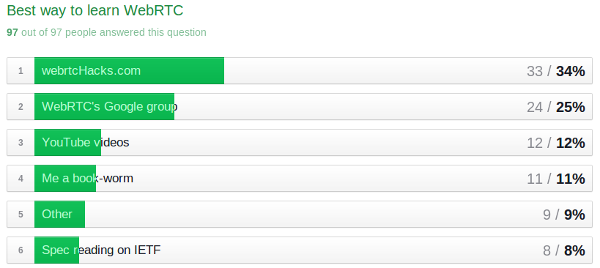
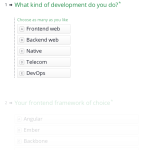




Leave a Reply